Key takeaways:
- Digital literacy involves critical evaluation of online information and effective communication in diverse digital spaces.
- Empowerment through digital literacy enables individuals to express ideas and engage constructively with others, influencing group dynamics.
- Understanding digital footprints is crucial for reputation management and responsible online behavior.
- Utilizing tools like online collaboration platforms and note-taking apps can enhance organizational skills and improve learning experiences.
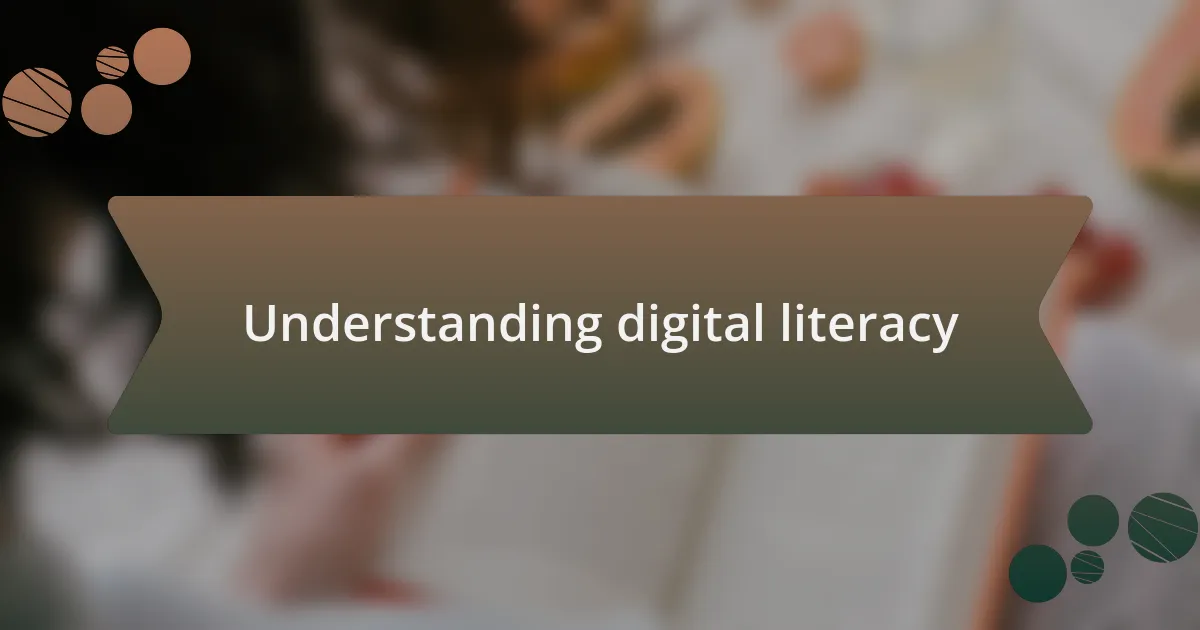
Understanding digital literacy
Digital literacy is more than just knowing how to use devices; it’s about understanding how to navigate the vast world of information online. I remember the first time I felt completely lost in a flood of data while trying to research a topic for class. It hit me then how essential it is to not only access information but also to evaluate its credibility. Have you ever found yourself questioning whether a source is reliable?
There are layers to digital literacy that extend beyond technical skills. It’s about creating, communicating, and expressing oneself effectively in a digital environment. I often think about the way social media platforms have transformed our communication styles. Do we really grasp how to articulate our thoughts while ensuring they resonate with diverse audiences? Emotionally, I’ve felt both the thrill of connecting with others and the anxiety of miscommunication in digital spaces.
Ultimately, it’s imperative to cultivate a mindset of critical engagement and ethical responsibility. During my journey in understanding digital literacy, I’ve learned that it’s not only about what we share but also how it impacts others. Each click, like, or tweet can influence perceptions and create lasting impressions—something I constantly remind myself of as I engage with digital content.
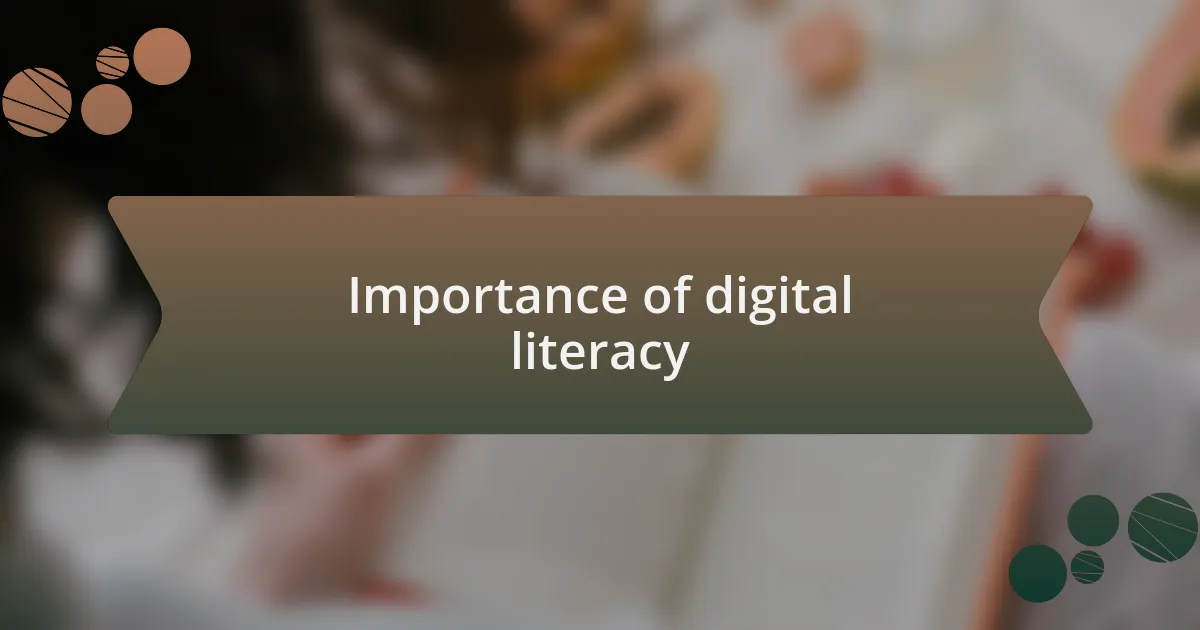
Importance of digital literacy
Digital literacy is crucial today as it empowers individuals to thrive in an increasingly digital world. I recall a time when I struggled to differentiate between informative content and misleading misinformation while doing research for a project. These experiences underscore the necessity of being able to discern credible sources and accurate information regularly.
In my opinion, being digitally literate also fosters a sense of empowerment. The first time I created a blog post, I felt a mix of excitement and nervousness. It was liberating to know that I could express my thoughts and potentially reach a wide audience. This need for self-expression and connection is heightened in our digital age, where sharing ideas can spark movements and change perceptions. Are we leveraging that power to make a difference?
Moreover, digital literacy impacts our engagement with others. I’ve often reflected on how debates and discussions online can be incredibly constructive or damaging depending on how we communicate. Have you ever thought about how a single comment can influence group dynamics? Mastering the nuances of online communication can ensure that our interactions contribute positively to our communities.
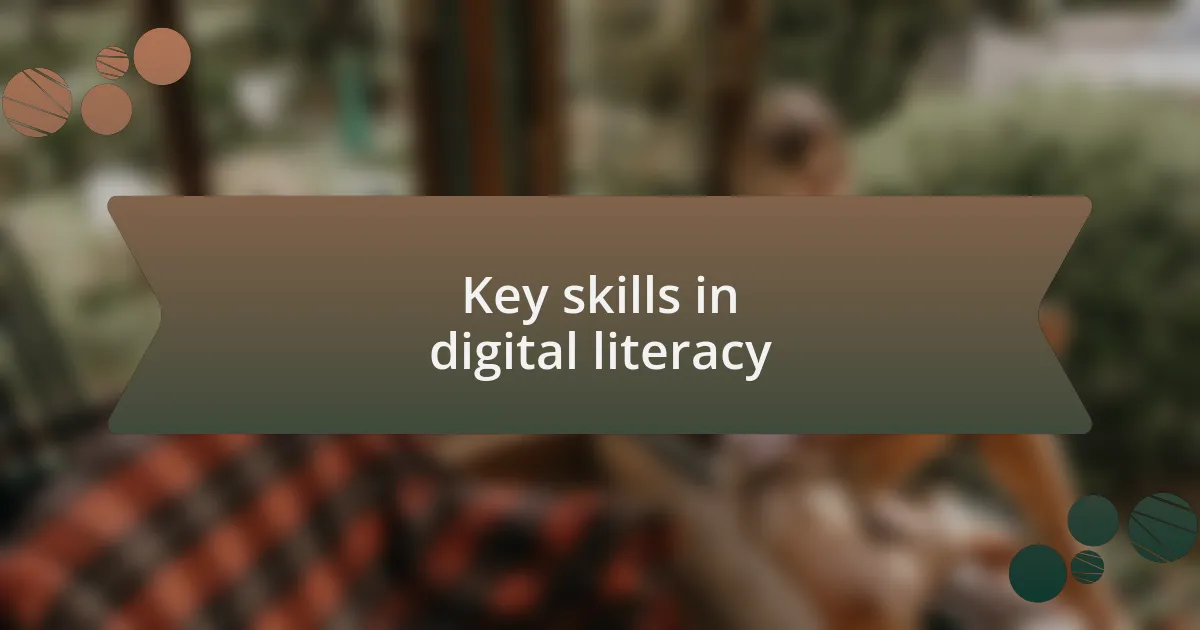
Key skills in digital literacy
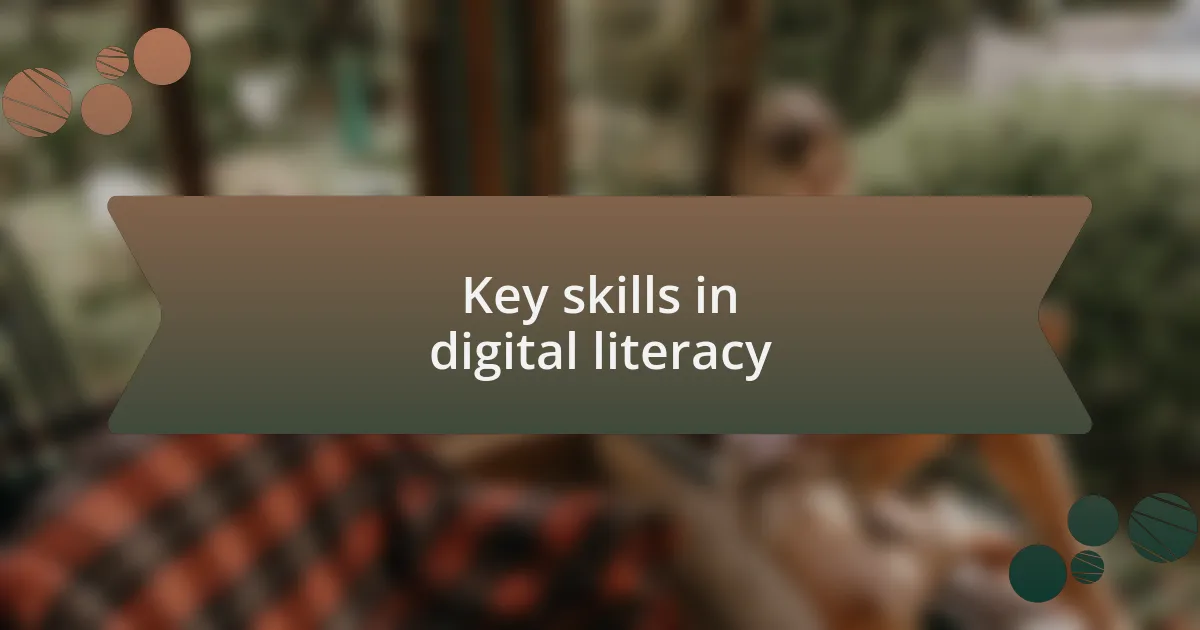
Key skills in digital literacy
One of the essential skills in digital literacy is the ability to evaluate online information critically. I remember feeling overwhelmed by the sheer volume of resources available during my research days. Learning to assess a source’s credibility made my work more efficient and significantly improved my project outcomes. Have you ever clicked on a headline only to realize the content didn’t live up to its promise?
Another key skill is effective online communication. I often find myself navigating various platforms, from social media to email, each requiring a different tone and approach. There was a time when I miscommunicated a crucial message on a group chat due to overly casual language, leading to misunderstandings. Reflecting on that experience, I value how varying my communication style helps maintain clarity and fosters better relationships online.
Lastly, digital literacy includes understanding digital footprints—the trail we leave in our online activities. It wasn’t until I discovered how my social media posts could be perceived long after they were made that I began to be cautious about what I shared. Do you ever think twice before posting something? This awareness of privacy and reputation management is vital for anyone wanting to navigate the digital world responsibly.
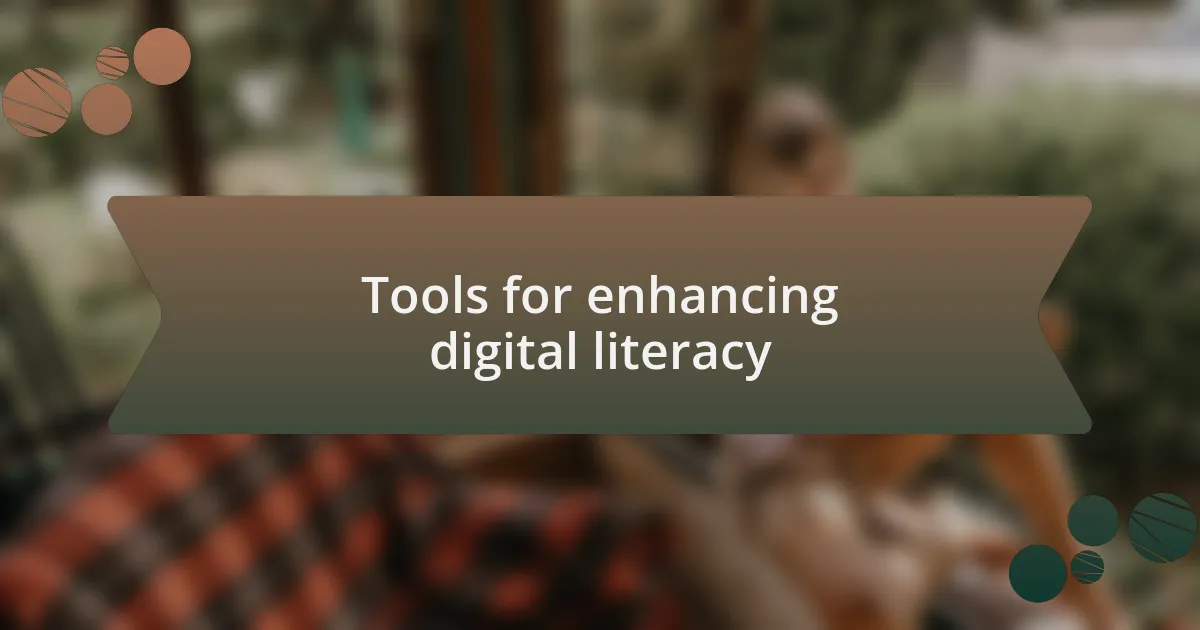
Tools for enhancing digital literacy
When it comes to tools for enhancing digital literacy, one standout is online collaboration platforms, like Google Workspace. I remember my first team project where we had to compile a shared report. The real-time editing feature allowed us to work simultaneously, transforming what could have been a chaotic email exchange into a streamlined and productive experience. How often do you find yourself juggling multiple communication tools?
Another valuable tool is digital note-taking apps, such as Evernote or Notion. I still recall the satisfaction of organizing my thoughts in a visually appealing, categorized manner rather than drowning in messy handwritten notes. These apps not only improve organization but also allow for easy retrieval of information. Have you ever lost track of an important idea because it wasn’t stored effectively?
Lastly, learning management systems (LMS) like Moodle are crucial for enhancing digital literacy in educational settings. They enable structured learning environments where I have been able to access resources, engage with peers, and submit assignments seamlessly. Reflecting on my own experiences, I see how these platforms provide a rich, interactive learning experience that nurtures digital skills—do you utilize an LMS to its full potential?
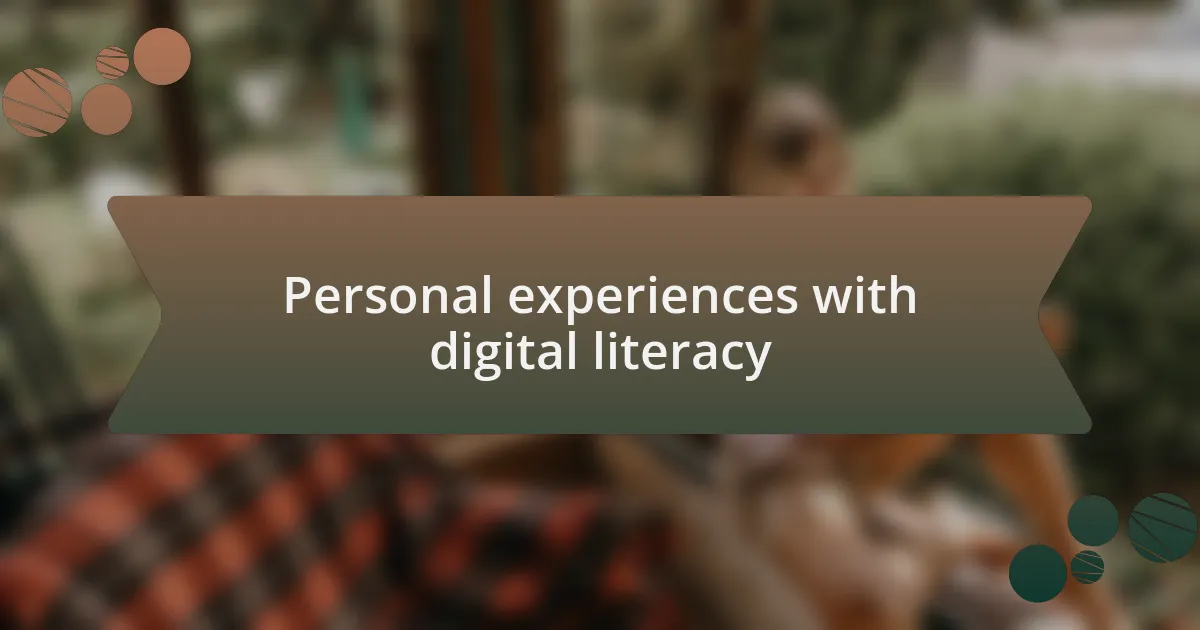
Personal experiences with digital literacy
Navigating digital literacy has been quite a journey for me. I vividly remember the first time I had to create a presentation using online tools. The sheer panic I felt when I realized I could no longer rely on physical materials was eye-opening. That experience taught me to embrace digital platforms, not just as a necessity, but as a means to unleash my creativity. How about you? Do you feel empowered or overwhelmed by digital tools?
In my experience, participating in virtual workshops really deepened my understanding of digital literacy. I signed up for a webinar on effective online communication and realized how different it felt to interact in a virtual space compared to face-to-face. It forced me to pay closer attention to tone, body language, and even the simplicity of my language. Have you ever considered how much our communication changes when we’re not in the same room?
Doing research online has definitely changed my approach to gathering information. I remember feeling lost at first, bombarded by countless search results. However, once I learned how to use advanced search techniques and evaluate sources critically, it was like unlocking a treasure chest of knowledge. Now, I feel excited rather than daunted by the vast resources at my fingertips. How do you approach your online research to ensure you’re finding credible information?
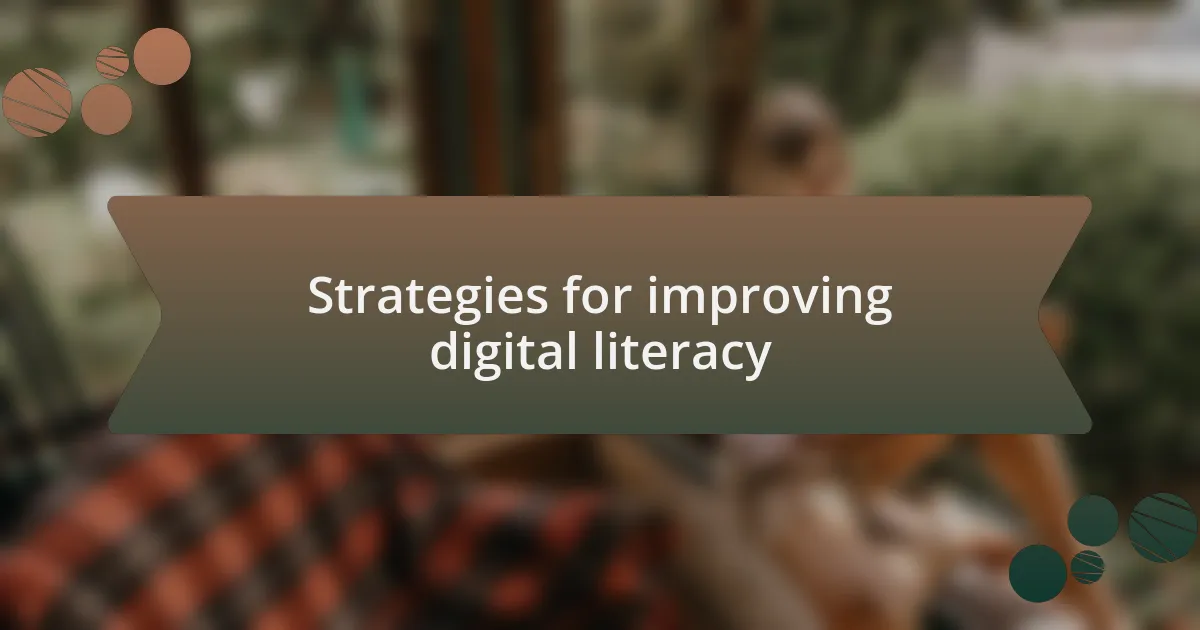
Strategies for improving digital literacy
Embracing online tools has been key in enhancing my digital literacy. I recall a time when I took the initiative to use a new project management app to coordinate a group assignment. At first, I was hesitant and overwhelmed, but as I familiarized myself with its features, it transformed how our team communicated and collaborated. Have you tried any tools that initially intimidated you but eventually became essential?
Reading and engaging with diverse sources has also fortified my understanding. I often find myself diving into educational blogs and forums where like-minded individuals discuss trends and challenges. This not only broadens my perspective but also inspires me to experiment with different digital formats. What are your go-to resources for staying updated in the digital landscape?
Moreover, setting aside dedicated time for practice has proven invaluable. I remember creating a personal blog as a way to express my thoughts and hone my writing skills digitally. The more I posted, the more comfortable I became with incorporating multimedia elements, enhancing my engagement with readers. How do you practice your digital skills to become more proficient and confident?